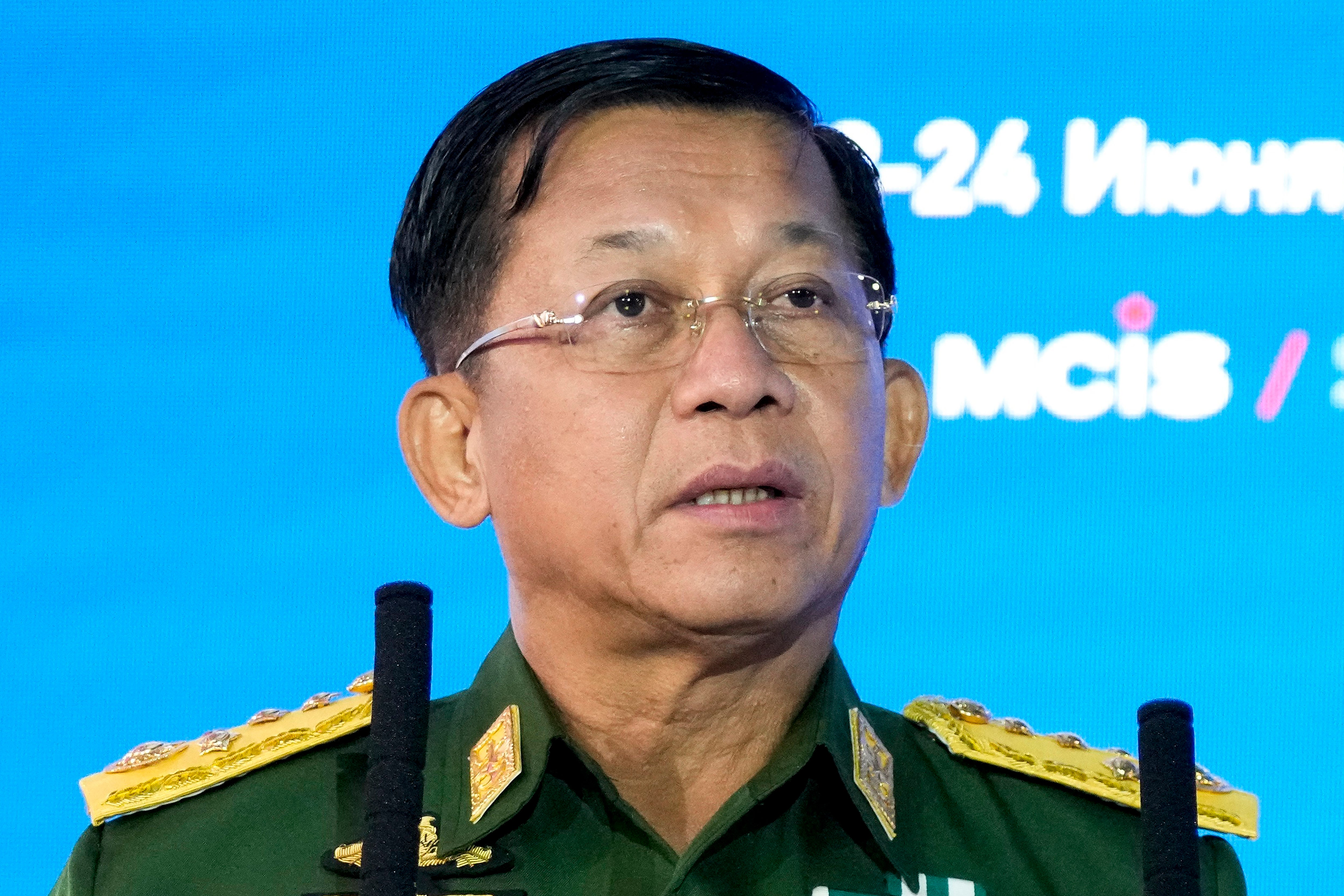Myanmar army leader touts election plan on Independence Day
Myanmar’s ruling military leader, Senior Gen. Min Aung Hlaing, has described plans for an election later this year and called for national unity in a speech as he led a ceremony marking the 75th anniversary of independence from Britain

Your support helps us to tell the story
From reproductive rights to climate change to Big Tech, The Independent is on the ground when the story is developing. Whether it's investigating the financials of Elon Musk's pro-Trump PAC or producing our latest documentary, 'The A Word', which shines a light on the American women fighting for reproductive rights, we know how important it is to parse out the facts from the messaging.
At such a critical moment in US history, we need reporters on the ground. Your donation allows us to keep sending journalists to speak to both sides of the story.
The Independent is trusted by Americans across the entire political spectrum. And unlike many other quality news outlets, we choose not to lock Americans out of our reporting and analysis with paywalls. We believe quality journalism should be available to everyone, paid for by those who can afford it.
Your support makes all the difference.Myanmar’s ruling military leader, Senior Gen. Min Aung Hlaing, on Wednesday described plans for an election later this year and called for national unity in a speech as he led a ceremony marking the 75th anniversary of independence from Britain.
He urged other nations and international organizations, as well as his country’s own people, to support “the genuine, discipline-flourishing multiparty democratic system,” a concept the ruling military has defined as its goal.
The first real move toward holding polls could occur at the end of this month, when the latest six-month extension of a state of emergency is completed. The state of emergency was instituted to allow military rule after the army seized power in February 2021 from the elected government of Aung San Suu Kyi.
The army’s takeover reversed nearly a decade of progress toward democracy after five decades of military rule. The military has said it acted due to massive voting fraud in the poll, though independent election observers did not find any major irregularities.
“Upon accomplishing the provisions of the state of emergency, free and fair elections will be held in line with the 2008 constitution, and further work will be undertaken to hand over state duties to the winning party in accordance with the democratic standards,” Min Aung Hlaing declared in his speech in the capital, Naypyitaw, where he also presided over a large-scale parade.
Military units and civil servants marched in formation close to the grandiose parliament complex while fighter jets, bombers and helicopters flew overhead.
The plan for a general election is widely seen as an attempt to normalize the military’s seizure of power through the ballot box and to deliver a result that ensures the generals retain control. The military will control the entire process and has spent the past two years enfeebling any credible opposition.
Although not officially outlawed, the National League for Democracy, the popular former ruling party, has effectively been broken up, with its leaders and many of its members either in jail or in hiding. All forms of dissent are currently suppressed by the security forces, sometimes with lethal force.
The NLD, led by Suu Kyi, won a second successive landslide victory in the 2020 general election, a result that triggered its overthrow by the military the following year.
The army’s seizure of power led to peaceful nationwide protests that the security forces quashed with deadly force, triggering armed resistance that some U.N. experts characterize as civil war.
Myanmar's history even before the 2021 takeover was marked marked by decades of armed conflict between the central government and ethnic minorities seeking greater autonomy, mostly in border regions.
Armed conflict still rages through most of the country, and Min Aung Hlaing stressed that “the cessation of internal armed conflicts to ensure national solidarity and peace which are absolute necessities for our country and strenuous efforts are being made towards that end.”
Min Aung Hlaing's government’s toppling of democracy and fierce repression of all opposition have also made it a pariah state among many other countries, which have instituted political and economic sanctions against the ruling generals.
“It is seen that some organizations and countries had meddled in the internal affairs of Myanmar. However, we have decided to stand firm globally, while adhering to our foreign policy in order to safeguard the sovereignty, security and interests of our nation," he said.